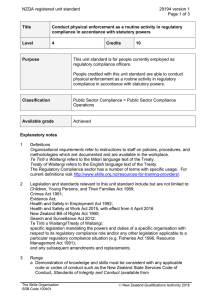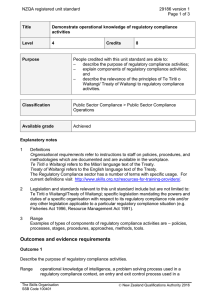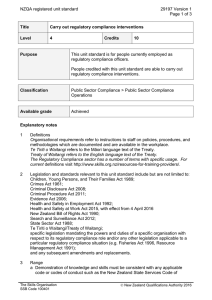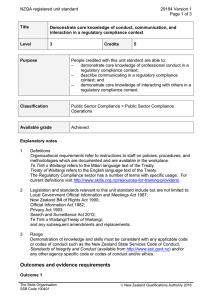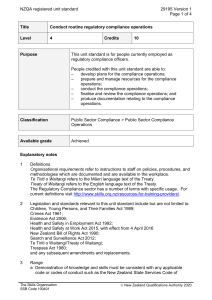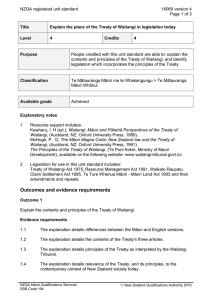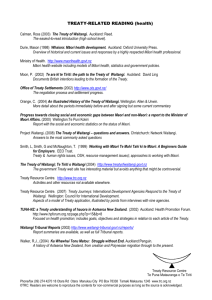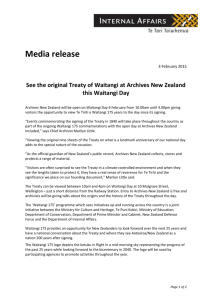NZQA registered unit standard 16225 version 5 Page 1 of 4
advertisement
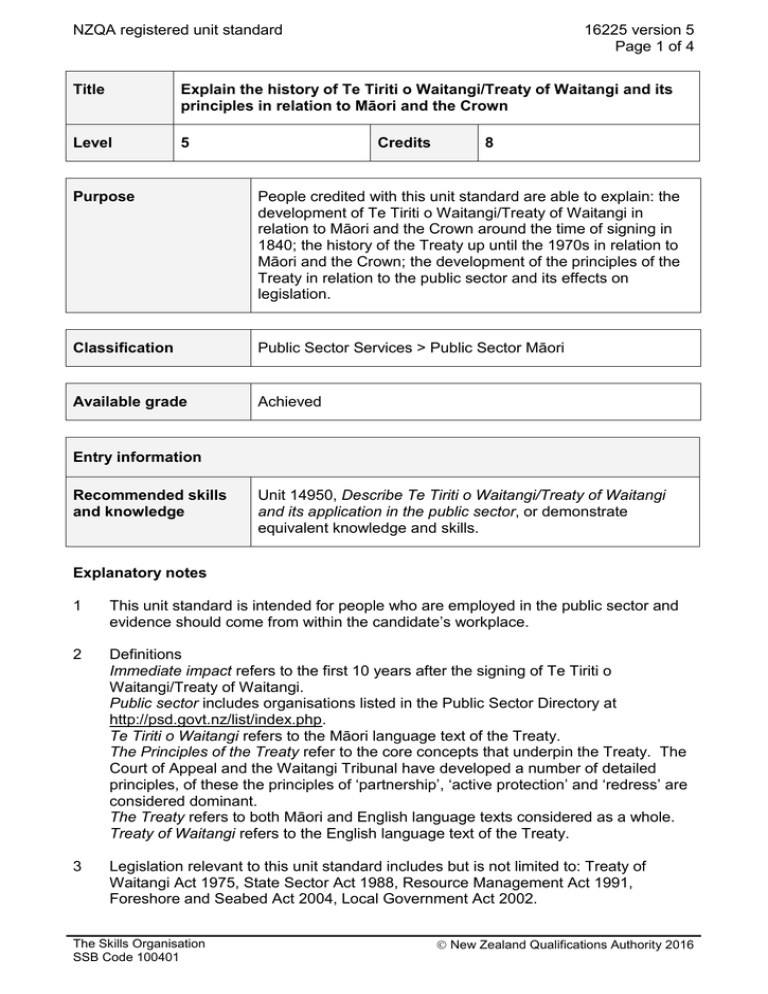
NZQA registered unit standard 16225 version 5 Page 1 of 4 Title Explain the history of Te Tiriti o Waitangi/Treaty of Waitangi and its principles in relation to Māori and the Crown Level 5 Credits 8 Purpose People credited with this unit standard are able to explain: the development of Te Tiriti o Waitangi/Treaty of Waitangi in relation to Māori and the Crown around the time of signing in 1840; the history of the Treaty up until the 1970s in relation to Māori and the Crown; the development of the principles of the Treaty in relation to the public sector and its effects on legislation. Classification Public Sector Services > Public Sector Māori Available grade Achieved Entry information Recommended skills and knowledge Unit 14950, Describe Te Tiriti o Waitangi/Treaty of Waitangi and its application in the public sector, or demonstrate equivalent knowledge and skills. Explanatory notes 1 This unit standard is intended for people who are employed in the public sector and evidence should come from within the candidate’s workplace. 2 Definitions Immediate impact refers to the first 10 years after the signing of Te Tiriti o Waitangi/Treaty of Waitangi. Public sector includes organisations listed in the Public Sector Directory at http://psd.govt.nz/list/index.php. Te Tiriti o Waitangi refers to the Māori language text of the Treaty. The Principles of the Treaty refer to the core concepts that underpin the Treaty. The Court of Appeal and the Waitangi Tribunal have developed a number of detailed principles, of these the principles of ‘partnership’, ‘active protection’ and ‘redress’ are considered dominant. The Treaty refers to both Māori and English language texts considered as a whole. Treaty of Waitangi refers to the English language text of the Treaty. 3 Legislation relevant to this unit standard includes but is not limited to: Treaty of Waitangi Act 1975, State Sector Act 1988, Resource Management Act 1991, Foreshore and Seabed Act 2004, Local Government Act 2002. The Skills Organisation SSB Code 100401 New Zealand Qualifications Authority 2016 NZQA registered unit standard 16225 version 5 Page 2 of 4 4 Repealed legislation relevant to this unit standard includes but is not limited to: Militia Ordinance 1845 (commonly referred to as the Arms Ordinance), Constitution Act 1852, Native Reserves Act 1864, New Zealand Settlements Act 1863, Native Rights Act 1865, Māori Representation Act 1867, Native Schools Act 1867, Resident Magistrates Act 1867, Native Lands Act 1873, Advances to Settlers Act 1894, Tohunga Suppression Act 1907, Māori Affairs Act 1953, Native District Regulations Act 1858, Native Districts Circuit Courts Act 1858. 5 Performance of outcomes of this unit standard will require consideration of the underlying values and responsibilities of people working in the public sector including standards of integrity and conduct and the Te Tiriti o Waitangi/Treaty of Waitangi and its principles. Outcomes and evidence requirements Outcome 1 Explain the development of Te Tiriti o Waitangi/Treaty of Waitangi in relation to Māori and the Crown around the time of signing in 1840. Evidence requirements 1.1 Explanation includes the political motivations and perspectives of the Treaty partners around the signing of Te Tiriti o Waitangi/Treaty of Waitangi. 1.2 Explanation includes a comparison of the socio-economic position of Māori and Pākehā around the time Te Tiriti o Waitangi/Treaty of Waitangi was signed. Range 1.3 examples may include but are not limited to – comparison of economic enterprises of Māori and Pākehā, economic base of Māori and Pākehā in relation to land, fisheries, other resources, health status, status of languages both written and oral; evidence of three comparisons is required. Explanation includes a comparison of the immediate impact of the signing of Te Tiriti o Waitangi/Treaty of Waitangi for both parties. Outcome 2 Explain the history of the Treaty up until the 1970s in relation to Māori and the Crown. Evidence requirements 2.1 Explanation outlines the key factors and events that led to the loss of Māori land. Range The Skills Organisation SSB Code 100401 examples may include but are not limited to – Crown land purchasing programmes in the 1870s and onwards, New Zealand Settlements Act 1863, Native Land Court. New Zealand Qualifications Authority 2016 NZQA registered unit standard 2.2 16225 version 5 Page 3 of 4 Explanation outlines the activities and conduct by Māori, iwi or hapū to advance the recognition of the Treaty in policy and legislation. examples may include but are not limited to – Native District Regulations Act 1858, Native Districts Circuit Courts Act 1858, te kotahitanga movement, Kingitanga movement, Māori seats in government. Range Outcome 3 Explain the development of the principles of the Treaty in relation to the public sector and its effects on legislation. Evidence requirements 3.1 Explanation outlines the development of the principles of the Treaty in relation to the public sector. 3.2 Explanation outlines the effects of the principles of the Treaty on legislation. Range examples may include but are not limited to - State Sector Act 1988, Resource Management Act 1991, Foreshore and Seabed Act 2004, Local Government Act 2002. evidence of two examples is required. Planned review date 31 December 2015 Status information and last date for assessment for superseded versions Process Version Date Last Date for Assessment Registration 1 25 March 1999 31 December 2012 Revision 2 21 August 2001 31 December 2012 Revision 3 13 June 2003 31 December 2012 Review 4 25 October 2007 31 December 2012 Review 5 14 April 2011 N/A Consent and Moderation Requirements (CMR) reference 0121 This CMR can be accessed at http://www.nzqa.govt.nz/framework/search/index.do. Please note Providers must be granted consent to assess against standards (accredited) by NZQA, before they can report credits from assessment against unit standards or deliver courses of study leading to that assessment. Industry Training Organisations must be granted consent to assess against standards by NZQA before they can register credits from assessment against unit standards. The Skills Organisation SSB Code 100401 New Zealand Qualifications Authority 2016 NZQA registered unit standard 16225 version 5 Page 4 of 4 Providers and Industry Training Organisations, which have been granted consent and which are assessing against unit standards must engage with the moderation system that applies to those standards. Requirements for consent to assess and an outline of the moderation system that applies to this standard are outlined in the Consent and Moderation Requirements (CMRs). The CMR also includes useful information about special requirements for organisations wishing to develop education and training programmes, such as minimum qualifications for tutors and assessors, and special resource requirements. Comments on this unit standard Please contact The Skills Organisation info@skills.org.nz if you wish to suggest changes to the content of this unit standard. The Skills Organisation SSB Code 100401 New Zealand Qualifications Authority 2016
